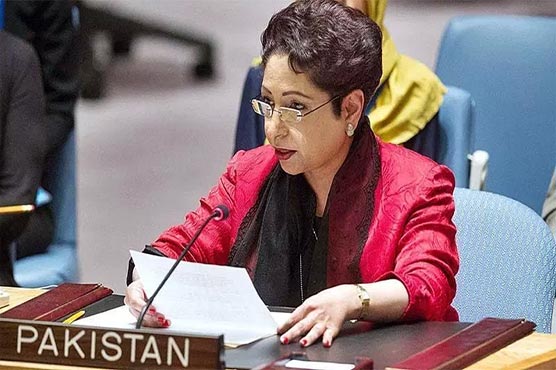At UN, Pakistan calls for resolving Kashmir & Palestine disputes for world peace

Ambassador Maleeha Lodhi told a high-level event on how to achieve a culture of peace.
UNITED NATIONS (APP) - On the eve of the 73nd session of United Nations General Assembly, Pakistan has called for strengthening the world body’s role in conflict resolution, while spotlighting Kashmiri people’s decades-long struggle for their right to self-determination in Indian occupied Kashmir.
“We must summon the collective will to address protracted and complex disputes and not ignore them simply because they appear intractable, for then, sustainable peace will remain a distant dream, ” Ambassador Maleeha Lodhi told a high-level event on how to achieve a culture of peace amid current global challenges and threats to stability, prosperity and the planet.
Peace could not be achieved amid widespread economic and social deprivation, human rights abuses and situations of political and economic injustice, the Pakistani envoy said on Wednesday.
“Foreign occupation and the denial of fundamental rights including the right to self-determination exacerbate the sense of injustice among the occupied and the oppressed,” she told delegates from around the world.
“Nowhere is this more apparent than in the pain and suffering of the people of occupied Jammu and Kashmir and Palestine.”
Ambassador Lodhi also referred to the situation in Palestine where she said the two-state solution was being systematically dismantled in plain sight of the international community, while efforts were also underway to strike at the roots of Palestinian identity and their existence as a people.
“In occupied Jammu and Kashmir,” the Pakistani envoy said, “the valiant struggle of the Kashmiri people for their right to self-determination is being brutally suppressed by an occupation which is inhibited, neither by norms of international law, nor the mores of conscience and morality.”
In this context, Ambassador Lodhi drew attention to he recent report issued by United Nations High Commissioner for Human Rights which documented in detail the grim human rights situation in the occupied territory.
Underscoring that an edifice of peace can only be built on the foundation of justice, the Pakistani envoy said the resolution of long-standing international disputes remains central to this imperative.
“A strengthened role for the UN in conflict resolution can serve as the most effective instrument to promote a culture of peace,” she added.
Ambassador Lodhi cautioned that those opposed to peaceful coexistence often find sustenance in exploiting differences on religious beliefs, culture and social outlook.
“There is however, more that unites us than what divides us. We need to identify and build on these commonalities. Cultural diversity can be promoted as a cohesive force in multi-cultural, multi-religious and multi-ethnic societies,” she said.
“To make this happen, we have to join forces and summon our collective energy to engage in genuine and constructive dialogue across cultures and religions,” she said, while stressing that the media, academia, religious leaders, civil society organizations and youth play their role in disseminating values of moderation and tolerance.
Pakistan, along with the Philippines, has taken the lead in presenting a resolution on “Promotion of inter-religious and intercultural dialogue, understanding and cooperation for peace.”
This resolution, she said, enjoyed the unanimous support of UN General Assembly, and was a reflection of the commitment to achieving lasting peace.
“This, we believe, is our contribution to fulfilling the promise of working towards achieving a real Culture of Peace.
As one of the world’s largest troop contributing countries to UN peacekeeping, Pakistan also has helped promote peace and stability across war-torn regions. “Over 150 of our brave sons have made the ultimate sacrifice for the cause of peace”, she said.
As an active supporter of the UN Alliance of Civilizations, Pakistan has also engaged in efforts to find common ground between diverging points of view and work together with all stakeholders for international peace and security.
“These, we believe, are some of our contributions to fulfilling the promise of working towards achieving a real Culture of Peace,”Ambassador Lodhi said in conclusion.
As is always the case, an Indian delegate objected to Pakistan’s reference to Kashmir, and harping on the same old tune that the state is an part of India.

